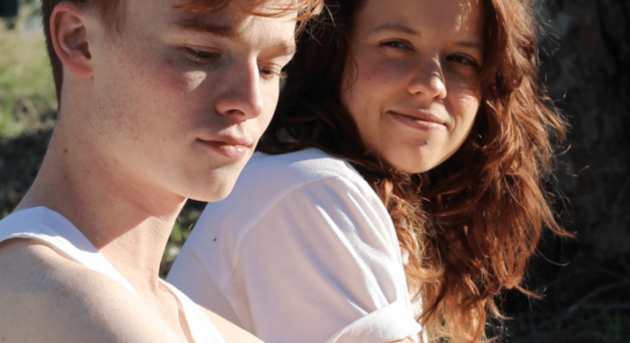Hell’s Canyon at La Mama
Caitlin and Oscar haven’t spoken in six months. After the death of Oscar’s brother, things weren’t quite the same between them. But when Caitlin texts Oscar out of the blue, he comes running. The unlikely pair share a haunting memory, so they make a pact to run. To disappear. Completely.
Developed through Playwriting Australia at the National Script Workshop, Hell’s Canyon is a powerful two-hander written by up and coming Melbourne playwright Emily Sheehan. Straight off the back of its critically acclaimed Sydney tour, the award winning play transfers to Melbourne. We chat to Conor Leach and Isabelle Ford as they prepare for their season at Trades Hall, Carlton, in conjunction with La Mama Theatre.

How has it been working on a new play (as opposed to an existing work)?
Conor: It’s been so liberating. We haven’t had to battle any preconceptions about how we ‘should’ play a moment or ‘should’ see this world, which can stem from seeing other adaptations of something you’re working on. The one concrete resource we’ve had is the text. I think it’s allowed Izzy and I to trust our responses to the words and our ways of empathising with these characters. We’ve embraced our impulses.
Isabelle: Working on a new play has been fantastic, I have found that it has given me the scope and freedom to craft a world and a character with the team that is collaboratively built from all of our own imaginations without the pressure of preconceptions of the piece or of Caitlin (the character I play).
Conor, as a new graduate, what tips would you give actors hoping to find work?
Conor: The best advice I’ve been given is when you are working, do it well. Rather than trying to communicate a certain image, commit to the story you’re telling. No one wants to watch a performer trying to impress. An audience wants you to tell a story above all else; people will respond to that. Also, actively participate in your community! See work, talk about work, invite people to your work, know the climate, know what’s happening next. Don’t be a stranger.
Isabelle, could you tell me a bit about your work with the MTC and Playwriting Australia?
Isabelle: I had the privilege of working on the script development of “Untold” for Melbourne Theatre Company’s Cybec season, with a fantastic director named Justine Campbell and her collaborator Sarah Hamilton. I had never been privy to a script development before, so being in the room and throwing ideas around with the writer, director, dramaturg and other actors was a fantastic experience. And performing Untold for MTC’s Cybec Electric was really special. Emily Sheehan (the playwright of Hell’s Canyon) saw me read at MTC’s Cybec and asked me be in the development for “Hells Canyon” for Playwriting Australia’s National Play Festival. Playwriting Australia also cast me in another play development called “Like Sex” by Nathan Joe which was part of an amazing New Zealand showcase called “Aotearoa Now”. Working on new plays while they’re still being written is an amazing experience. Hell’s Canyon is the most involved I have been in a play’s development process.

What drew you to work on Hell’s Canyon?
Conor: I hadn’t read an adolescent relationship written with such tenderness, honesty and detail. The writing is so good, it’s done the work for us. I could see both characters, their history, their isolation, and couldn’t help but feel for them. It’s a story that demands to be told. Also, the text reminded me of my teenage self. Behaviours like masking trauma, denying the truth, wishing to feel deeply and fully – those impulses are so common at that age and it was kind of exciting to revisit them. I also hadn’t explored the genre of magic realism much before, so I was eager to play in it.
Isabelle: The way that Emily writes is sharp, hilarious and has a very Australian vernacular. Her dialogue is something actors can really sink their teeth into and have a lot of fun with. After reading for Hells Canyon at the National Play Festival I was absolutely enamoured with the work. I love the story, the rich imagery and the relationship between Caitlin and Oscar.
How do you handle working with heavy subject matter?
Conor: A week before rehearsals began for our Sydney season, one of my loved ones passed away. Indeed, many of my emotions and thoughts paralleled those in the text. I didn’t want to ‘use’ my own grief, however, in service of the story. The best thing I could do to handle the play’s subject matter was develop rituals – physical, vocal, mental – that separated work and life. This meant I could take care of my mental health and grieve as healthily as possible outside the room, without bringing it on the floor with me. Also, it was valuable to just remind myself that all an actor is doing is playing inside imagined circumstances and suspending disbelief, as children do. Emotions, when they arise in service to a story, don’t have to be an emergency.

As it’s just two of you on stage, how do you make sure you are completely focused in performance?
Isabelle: First of all, I am a very lucky lady as Conor is a fantastic actor with great sensitivity and a tremendous ability to listen, so we established a bond early in the piece which has helped us be attuned to one another at all times. Conor and I have our acting exercises before we walk on stage, to make sure we are tuned into one another physically and emotionally, and to make sure that we are really speaking to each other and really hearing what the other person is saying.
Conor: There’s so much unsaid between them, so much that needs to be aired, so much that they need from one another. If I locate where it lies in my body and physically and vocally activate the need to speak – and the need to listen – materialises organically, so I can’t help but place my attention on Izzy. Also, the characters haven’t spoken in six months. The tension between them – psychological, emotional, sexual – is stratospheric. Izzy and I developed rituals to activate that before we walk on stage.
Why do you think people should see Hell’s Canyon?
Conor: The characters in Hell’s Canyon are fraught, multifaceted, erratic. One moment they’re scorching each other, the next they’re soothing each other. Emily’s written such an honest exploration of how we handle trauma in times of intense personal crisis. The play takes you on that journey, but what I love is that it ultimately instils hope in you.
Isabelle: Hell’s Canyon shows that no matter what life throws at you, no matter how messy and awful things can seem, there is ALWAYS a reason to keep going. Dealing with those big scary things head on is what makes someone truly strong and courageous. I also think our play shows the importance of allowing yourself to give voice to what’s really going on for you, because holding onto secrets and putting a lid on your pain only creates more suffering. We are all human and sharing your experiences can make others feel less alone.
Hell’s Canyon opens September 12th at Trades Hall, Carlton. The season runs until September 23rd. Tickets are available now at the La Mama website.




